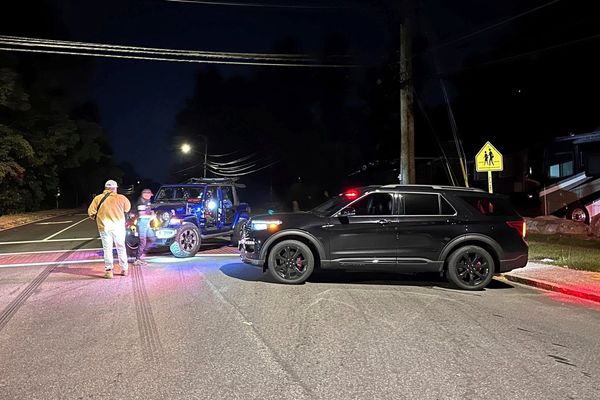Please enjoy the latest edition of Short Circuit, a weekly feature written by a bunch of people at the Institute for Justice.
New cert petition: Earlier this year, the Second Circuit granted absolute immunity to Suffolk County, N.Y. prosecutors who brought baseless charges as a favor to a company seeking to retaliate against its former employees and their lawyer. But friends, a state appellate court ruled that the prosecution violated the First and Thirteenth Amendments—and thus was outside the bounds of the prosecutors' authority. And at common law, officials acting outside the scope of their authority would never have enjoyed immunity.
- A computer scientist and an inventor challenge the provisions of the Digital Millennium Copyright Act that make it illegal to bypass computer code used to block unauthorized access to copyrighted materials. The former wants to publish a book on the topic for research purposes, while the latter wants to sell a device containing code that can bypass security measures. Valid First Amendment claims? D.C. Circuit: The gov't made clear the law did not apply to the book, and there's no problem regulating the device, because the gov't is targeting the code's function, not what it communicates.
- Allegation: Deceased hotelier's children from his first marriage take out big loans to benefit businesses in which they inherited a large interest. The loans are guaranteed by the estate, in which the children from his second marriage—"the Jamestown clan"—have a larger share. Jamestown clan plaintiff: Which is a RICO! Now we drink your milkshake. First Circuit: Point of fact, these claims do belong in federal court. Case undismissed.
- New York man runs a secret society that is all women (other than him), structured as a pyramid of "masters" and "slaves"—the latter of which give up blackmail material on themselves to join. He's convicted of sex-trafficking for the sexual favors he received but says he didn't commit what the statute calls a "commercial sex act" because nobody made a profit. Second Circuit: Getting "anything of value" satisfies the statute, and that includes the preferred positions and free labor that "masters" in the scheme received. Convictions affirmed.
- Allegation: Honduran immigrant, who'd been ordered removed in 2004 as a child and then granted deferred status in 2013, regularly visits Louisville, Ky. ICE facility to post bond for detainees and is on a first name basis with many of the agents until … they arrest her! During her eight days in custody, she's shuttled to eight or nine facilities in three states and deprived of food and sleep. Sixth Circuit (over a dissent): And some her claims should not have been dismissed.
- Vending from the same spot on the sidewalk for years may create a lot of things—loyal customers, a sense of place, a nagging pain in your lower back—but it does not, says the Sixth Circuit, create a property right in that spot.
- Catholic medical organizations: The Affordable Care Act (and its implementing regulations) require us to perform and insure gender-transition procedures or face criminal and civil penalties and lose federal funding. Which violates the First Amendment. Feds: Yeah, but maybe the statute doesn't require that, and maybe we wouldn't enforce it if it did. Eighth Circuit: Permanent injunction affirmed.
- You know the Hollywood Foreign Press Association? They're the club for journalists who vote on the Golden Globes. Well apparently it's hard to get in. Like, really hard. Ninth Circuit: But no matter how hard it is to join, its exclusivity is not an antitrust violation.
- To protest the fossil-fuel industry, Bellingham, Wash. woman sabotages railroad line by installing a "shunt," a device that falsely indicates the presence of another train on the tracks, in an effort to stop an incoming train carrying crude oil. She is convicted of "Violence Against Railroad Carriers" and receives a sentencing enhancement for having "recklessly" endangered the safety of a mass transportation vehicle. Defendant: But I thought what I did was perfectly safe! Ninth Circuit: Well then you're an idiot.
- Noncitizen is twice convicted of child endangerment—driving drunk with a kid in the car. Deport him? Sitting en banc, and over the course of 169 pages, a divided Ninth Circuit says yes; California's child endangerment statute is sufficiently close to Congress's definition of the deportable offense of child abuse, neglect or abandonment.
- Ninth Circuit: Everybody knows that Takings Clause claims can be resolved in federal court without plaintiffs litigating in state court first. But what this opinion presupposes is—maybe this one can't?
- Armed robber fleeing Salt Lake City police crashes into an innocent tailor's shop. Bullets fly (196 bullets in 20 seconds by police alone, to be precise), the shop is badly damaged, the robber dies, and the shopkeeper is psychologically traumatized. Tenth Circuit: Which certainly stinks for the tailor, but the police, who didn't intend to harm him, didn't violate his rights.
- Rather than pulling over when a Bryan County, Okla. sheriff activated his lights for a taillight violation on an empty rural road, motorcyclist accelerates. She's going 90 mph when another officer veers in front of her, causing a crash. (She lives.) Excessive force? Tenth Circuit (unpublished): Qualified immunity. Dissent: She was a misdemeanant presenting little-to-no danger to others when the officer used deadly force—definitely enough to get a trial.
- When we last reported on the word "and," the Fifth Circuit declared it to mean "or" (in the context of the First Step Act's "safety valve" provision). The Eleventh Circuit (en banc) now rules "and," in fact, means "and." There are dissenting judges who disagree. And a concurring judge describes that disagreement as "the shootout at the Eleventh Circuit Corral [which] … produces no indisputable winner after the smoke clears."
- And in en banc news, the D.C. Circuit (over a dissent) will not reconsider its decision that an agency must go through notice and comment rulemaking when repealing a rule that was enacted under a preceding administration but had not become final when the new administration comes to power. (The request was made by a trade association that tried to intervene after the gov't stated it would not seek en banc review. The court denied intervention, thus foreclosing en banc review.)
- And in more en banc news, the Fifth Circuit will not reconsider its decision that it did not violate the Establishment Clause for a Texas Justice of the Peace—a former Pentecostal preacher—to open court with a prayer delivered by a local faith leader. Three judges disagree from denial, arguing that there was sufficient evidence that the judge was biased against litigants who did not participate in the prayer for the issue to go to a jury.
- And in additional en banc news, the Sixth Circuit will reconsider its decision granting habeas relief to a man sentenced to death for the rape and murder of a 9-year-old girl. The original panel held that defense counsel's failure to sufficiently challenge forensic evidence of the rape merited resentencing, while Judge White previously dissented on the grounds that the rape conviction was just one of four aggravating factors that the jury found merited the death penalty and thus there was no substantial likelihood that effective counsel could have achieved a different verdict.
Last year, a Fort Bend, Tex. officer arrested Justin Pulliam in retaliation for exercising his First Amendment right to record—and criticize—the police. When he was arrested, Justin was on private property with permission of the owner and well away from the active scene, a mental health call (a priority for Justin, since people experiencing emotional distress are at particular risk of being harmed by police). Justin spent several hours in jail, was strip searched, and was personally chided by the sheriff for refusing to speak without a lawyer present—the culmination of months of harassment by the dept. at the sheriff's behest. Click here to learn more about IJ's latest suit.
The post Short Circuit: A Roundup of Recent Federal Court Decisions appeared first on Reason.com.







